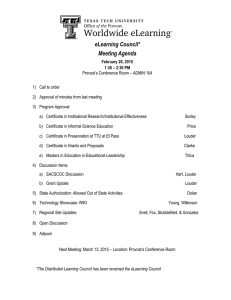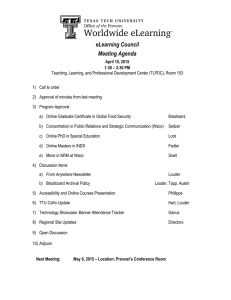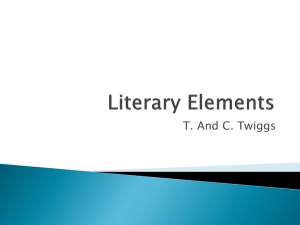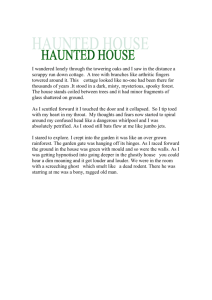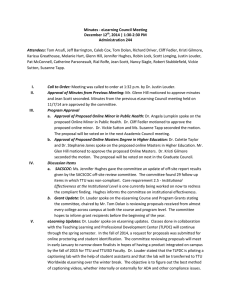Document 11405851
advertisement
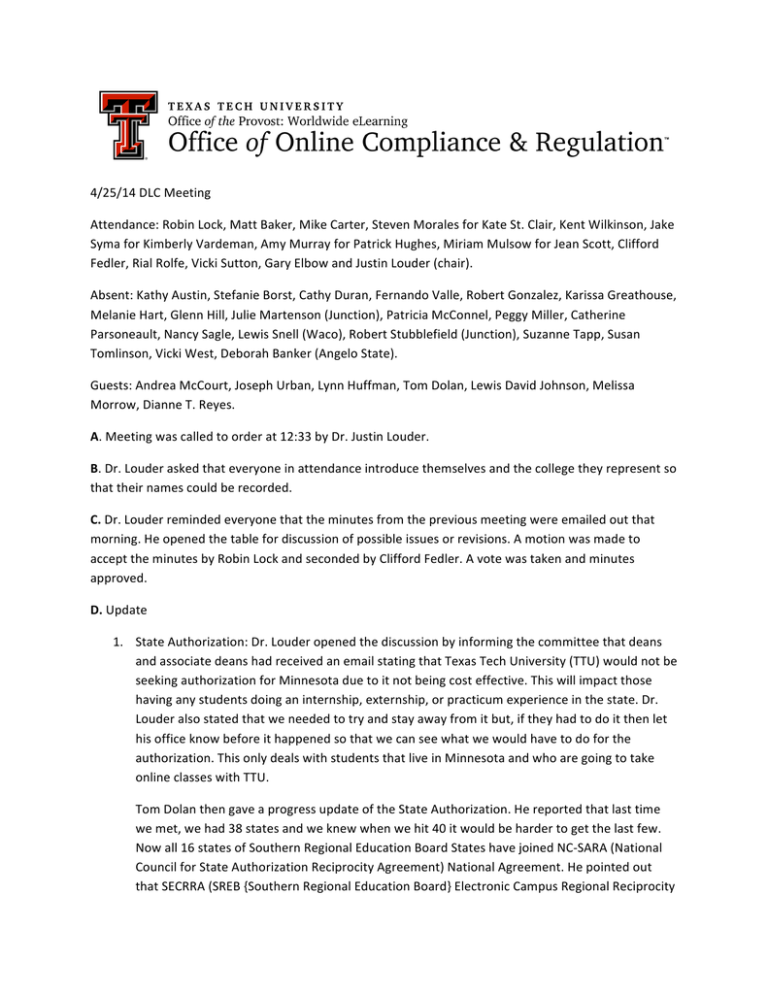
4/25/14 DLC Meeting Attendance: Robin Lock, Matt Baker, Mike Carter, Steven Morales for Kate St. Clair, Kent Wilkinson, Jake Syma for Kimberly Vardeman, Amy Murray for Patrick Hughes, Miriam Mulsow for Jean Scott, Clifford Fedler, Rial Rolfe, Vicki Sutton, Gary Elbow and Justin Louder (chair). Absent: Kathy Austin, Stefanie Borst, Cathy Duran, Fernando Valle, Robert Gonzalez, Karissa Greathouse, Melanie Hart, Glenn Hill, Julie Martenson (Junction), Patricia McConnel, Peggy Miller, Catherine Parsoneault, Nancy Sagle, Lewis Snell (Waco), Robert Stubblefield (Junction), Suzanne Tapp, Susan Tomlinson, Vicki West, Deborah Banker (Angelo State). Guests: Andrea McCourt, Joseph Urban, Lynn Huffman, Tom Dolan, Lewis David Johnson, Melissa Morrow, Dianne T. Reyes. A. Meeting was called to order at 12:33 by Dr. Justin Louder. B. Dr. Louder asked that everyone in attendance introduce themselves and the college they represent so that their names could be recorded. C. Dr. Louder reminded everyone that the minutes from the previous meeting were emailed out that morning. He opened the table for discussion of possible issues or revisions. A motion was made to accept the minutes by Robin Lock and seconded by Clifford Fedler. A vote was taken and minutes approved. D. Update 1. State Authorization: Dr. Louder opened the discussion by informing the committee that deans and associate deans had received an email stating that Texas Tech University (TTU) would not be seeking authorization for Minnesota due to it not being cost effective. This will impact those having any students doing an internship, externship, or practicum experience in the state. Dr. Louder also stated that we needed to try and stay away from it but, if they had to do it then let his office know before it happened so that we can see what we would have to do for the authorization. This only deals with students that live in Minnesota and who are going to take online classes with TTU. Tom Dolan then gave a progress update of the State Authorization. He reported that last time we met, we had 38 states and we knew when we hit 40 it would be harder to get the last few. Now all 16 states of Southern Regional Education Board States have joined NC-­‐SARA (National Council for State Authorization Reciprocity Agreement) National Agreement. He pointed out that SECRRA (SREB {Southern Regional Education Board} Electronic Campus Regional Reciprocity Agreement) is for 100% online programs only. If TTU has anyone doing an internship or externship in those state please let the office know because SECRRA does not release us from physical presence triggers. Mr. Dolan then explained that what was going to happen was that SECRRA’s 16 states were going to change their legislation to join NC-­‐SARA. So already on the agenda for the next Texas legislative session is to change the language enabling TTU in 2016 to be able to join NC-­‐SARA. Almost everything that TTU does at a distance is allowed under NC-­‐SARA except we look for professional licenses and we have to work with the agency in those states but almost everything else would have a reciprocity agreement. Dr. Louder informed the committee members that the office was working on a web form on our website that will allow faculty and students to fill out information if they are going to do an internship, externship or capture experience outside the state of Texas to make sure it does not impact our authorization. Questions were asked about TTU recruiting in those states and Dr. Louder replied that there are certain states that regulate marketing to their students so he instructed the committee to get with Mr. Dolan to figure out rules as they are different from state to state. Committee members also wanted to know about proctoring exams. Dr. Louder and Dr. Hart are in discussion and search of different online options with the possibility of an RFP being issued for distances proctoring and student authentication so that there can be secondary authorization, with the login eRaider being the first. If a student physically goes to a location then that can be regulated and that depends on the state so that is why eLearning is looking at online options for authorization. 2. Website Distance Education and Regional Sites have been updated. Please review your program specific pages on the Distance Education (DE) website, specifically the contact information. We are also finishing up a website with student support and other concerns for distance learners and should be ready in the near future. E. Discussion and approval of Certificates and Concentrations 1. Application for Upper-­‐Level Undergraduate Certificate Program, Strategic Leadership in Human Resources Development: Program Director Dr. Andrea McCourt spoke to the committee and explained the program. The certificate was developed for people who have been in the workplace, targeting personnel in management roles wanting formal education in the area of leadership which relates to leadership in the workplace. Dr. McCourt has been working with Dr. Jena Jones at Texas Tech University Health Science Center to partner our services with employees, which can be taken all online. No questions or concern regarding program, therefore agreement will sent to Academic Council. 2. Application for an Undergraduate Certificate Program WCOE, Cybersecurity for Critical Infrastructure: Dr. Joseph Urban explained that the project came out of an effort to look at Cybersecurity for Critical Infrastructure. The program consists of three core courses that are part of the program and is interdisciplinary in nature and that consist of Industrial Engineering, Mechanical Engineering, Electrical Engineering, and Computer Science out of the College of Engineering. He explained that students will take three core courses. The remaining two courses for the certificate will be taken as an elective in any one of those others in the Engineering Department. Questions were asked if class intent was to be fully online or asynchronized and what number of students were being expected. Dr. Urban replied that the intent is to be fully online with a few intensive courses that they are trying to figure out. These courses have already been offered as special topics and have experienced an average of 50/50 on terms of undergraduate and graduate students with around 10-­‐15 students, with advertising only on Tech Announce. The diverse students that are involved with this program are specialists in their engineering field but want to learn about cybersecurity. He feels that their alumni base will be supportive by recruiting in areas like Dallas and San Antonio. Dr. Urban also stated that if a student took the program as an undergraduate it would not be problematic as a graduate student. Dr. Urban will have to look and see if this program is for domestic students only. No further discussion was needed so program will be sent to Academic Counsel. 3. Application for a Graduate Certificate Program WCOE, Cybersecurity for Critical Infrastructure: Dr. Joseph Urban said the program is the same as undergraduate in that students will take three courses and the remaining two courses for certificate as an elective in any one of those others in the Engineering Department and an elective course from the School of Law. No further discussion was needed so program will be sent to Academic Counsel. 4. Concentration in Human Development and Family Studies: Dr. Lynn Huffman, College of Human Sciences, has requested to approve the concentration (which is different than a certificate). This is only offered at a distance and we are switching it from General Studies to a Concentration. It is open to any student in the University has been offered for a long time with classes always full. A question was asked regarding if the class was only obtained thru Human Sciences. Dr. Huffman explained that it will be opened to all students in the University as opposed to waiting for Distance Students to sign up first. No further discussion was needed and the program concentration will be sent to Academic Council. 5. Restaurant, Hotel, and Institutional Management (RHIM) concentration course rotation: Dr. Louder mentioned that this is a brand new concentration offered online. Also, that the University is offering some of these courses at Fredericksburg site due to them having a vineyard but wants it to be more than just a course therefore making it a concentration. No discussion or concerns were noted and will be sent to Academic Council. 6. Application for Certificate in Agricultural Communication Leadership: Dr. Louder discussed with the committee that this had gone thru Academic Council and Graduate Council but we could not find in the minutes that it has gone thru Distance Learning Council (DLC). So, we needed to officially go thru and get it in the minutes so we could submit to SREB to be covered by the reciprocity agreement. No discuss or concerns were noted and this has now gone through DLC successfully. F. Regional Site Updates: Dr. Louder gave short updates on regional sites and then each college representative in attendance gave a short update. Dr. Louder then informed the committee that the President had approved a central unit that he will lead known as TTU Worldwide eLearning. It will encompass Online Distance Education which will include the Office of Online Compliance and Regulation and a new Office of Instructional Design and Web Technologies that will supplement the Teaching, Learning and Professional Development Center (TLPDC) which will include adding additional staff. Dr. Louder said he hopes to incentivize the development of new courses and new programs so that any programs that are not developed online that want to move online can by applying for a grant. He said our thought is that we will do a program grant of $20,000 to $30,000 to move programs online that are not developed online. There will also be funding available to help pay faculty to teach additional classes online. There will also be course reviews where we pay to review classes that are already online for ADA Accessibility, Principles of Good Practices, and review courses that were developed 5-­‐6 years ago and have never been touched since and still use the same information. Dr. Louder than informed the committee that the Board of Regents (BOR) approved a distance education fee of $35 per semester hour for graduate and undergraduate for course labeled distance. Some of the money will come back to the Colleges, the Office of the Provost and the Central Unit. Also, money has to be put into a budget for marketing to grow program. G. Open Discussion: Dr. Louder let the committee know that he was going to try to put together a collaborative group to view a Blackboard Webinar and that Blackboard has a mobile app fully compatible for student use. Matt Baker asked that a standardization of what is being approved needs to be set in place due to the fact that we have mix of memo’s, spreadsheets, and 5-­‐6 page document proposals. Dr. Louder agreed to come up with template/process. H. Discussion of future meeting dates: For June and July committee choose to meet if needed. I. Adjourned at 1:29 p.m.
